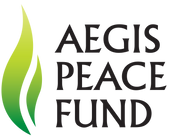Aegis Trust
Preventing Genocide and Crimes Against Humanity
Transforming Communities and Building Sustainable Peace
Aegis Trust works to prevent genocide and crimes and against humanity and builds sustainable peace. It grew out of the work of the National Holocaust Centre in 2000 and over the past 20 years, it has worked in fragile communities, especially in Rwanda and the Central African Republic.


Invited by the Government of Rwanda in 2002, Aegis worked with survivors to build the Kigali Genocide Memorial which opened in 2004. It is a final resting-place for 250,000 victims of the 1994 Genocide against the Tutsi and a major site of remembrance and learning both nationally and internationally. Aegis continues to be responsible for the Memorial which receives over 100,000 visitors per year, including many world leaders.
Memorials such as this support survivors and communities to recover by acknowledging crimes committed and by shedding light on how and why atrocities occur.
""If we can eradicate smallpox, put men on the moon and decipher the human genome, surely we can learn to stop killing each other.”
DR JAMES SMITH - AEGIS TRUST FOUNDER & CEO
It was at the memorial in 2008, that a unique peace education model was developed for young people at the Kigali Genocide Memorial who were asking many questions about the genocide.

Now established, Aegis’ Peace Education programme plays an important role in Rwanda’ extraordinary journey towards healing and reconciliation. It uses a unique story-telling methodology to draw learning from the past from personal accounts of acts of humanity, inspiring mindsets of empathy, trust, respect and shared responsibility for peace and stability. This educational approach has been integrated into the Rwandan national curriculum since 2016. It has also inspired leaders from divided communities internationally to partner with Aegis to build peace, such as in Central African Republic and South Sudan with educators from Rwanda, training local teachers to deliver Peace Education.
Preventing violence through peace education in at-risk countries is now at the core of Aegis Trust’s mission and strategy and forms the first of the three components that Aegis has identified that work together to enable community resilience and sustainable peace. These three components are shown below in Aegis Trust's Theory of Change.
Trauma healing is the second component. Communities in which Aegis Trust works have often been traumatised by armed conflict, mass atrocities and forced displacement. It is hard for them to rebuild their lives while trauma fuels fear and mistrust. Aegis works with partners to deliver trauma healing in combination with peace education and through the programmes, they also raise awareness about mental health wellbeing in schools and homes.
Sustainable livelihoods is the third component to build community resiliency. Peace education and trauma healing support upstream prevention of violence and prove a path to reconciliation, but in communities affected by climate change and conflict, economic crises and hunger can still leave young people vulnerable to radicalisation, recruitment to armed militia and sexual exploitation. Through the Aegis Peace Fund, economic wellbeing will be applied to strengthen communities where Aegis Trust works to deliver peace education.

Aegis Trust's Theory of Change

To coincide with the 30th Anniversary of the Genocide Against the Tutsi, Aegis Trust is launching the Isōko Peace Institute in the Bugesera District of Rwanda. It will embody these three pillars of community resiliency.
The Aegis Peace Fund financially enables this model to be scaled globally so communities at growing risk of economic and political shocks can be prevented from spiralling into conflict and violence.
Aegis Trust recognises that adverse climate conditions threatens the stability and social fabric of communities. The three pillar approach is a contribution to building resilience in areas at most risk.
